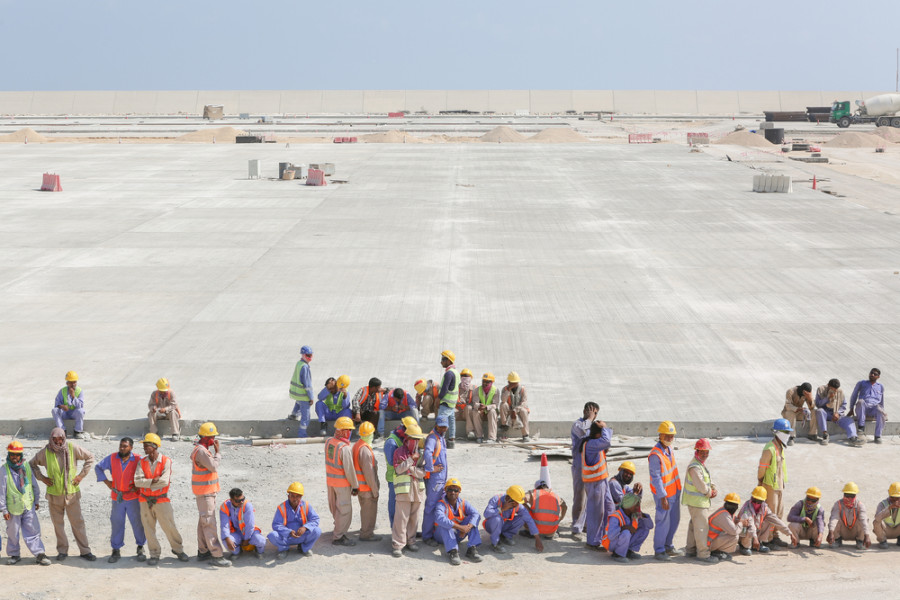National
Undocumented and overstaying Nepalis in Kuwait could be deprived of amnesty as Nepal is under lockdown
Kuwait government has offered a general amnesty to undocumented workers allowing them to leave the country without having to pay any fines and airfares and also the option to return Kuwait later.
Chandan Kumar Mandal
Hundreds of Nepali workers are likely to be deprived of the general amnesty scheme announced by the Kuwait government to illegal expatriates.
The scheme exempts illegal immigrants from the penalty of overstaying in Kuwait and also offers free air tickets if residency rule violators agree to join the amnesty.
However, there is an uncertainty regarding illegal Nepali workers benefitting from the amnesty, as their home country remains under lockdown at least until April 27 and incoming international flights suspended till April 30.
According to Kuwaiti government estimates, 7,000 Nepalis are either undocumented or have overstayed in Kuwait.
“Unlike previous amnesties, the current one is a unique one as those leaving the country can come back again later and will not have to bear any fines for breaching the visa rules. Also, Nepal doesn’t have to send any flights since the Kuwaiti government will be chartering the flight to send back the undocumented and overstaying expatriates,” said Suraj Maskey, a Nepali migrant worker from Kuwait.
“However, it looks like Nepalis cannot utilise the amnesty as lockdown and banning of international flights is still on. The government, including the labour minister, has said Nepali workers could not be brought home from Gulf countries.”
Kuwaiti government's general pardon has come in the light of the exceptional circumstances when the Gulf country is going through a tough time trying to combat the spread of the novel coronavirus in the country.
Since the Covid-19 pandemic has engulfed the world, Nepali migrant workers have been languishing in various labour destination countries, mainly in the Gulf states, Malaysia and South Korea.
The general amnesty will benefit expatriates who do not have valid residency permits or have overstayed in the country. The scheme, in place from April 1 to April 30, allows illegal immigrants to leave the country without paying any fines and also allows re-entry later with valid documents.
According to Kuwaiti authorities, airlines will be allowed to operate outbound flights from Kuwait to several destinations to ferry these illegal immigrants.Separate timeframes have been set for undocumented expats from various countries to apply for the amnesty programme.
Immigrants from the Philippines could apply from April 1-5 and Egyptians from April 6-10, while Bangladeshi can apply from April 11-15, Indians from April 16-20, Sri Lankans from April 21-25 and other nationalities, including Nepali workers, from April 26-30.
The Arab nation hosts over 70,000 Nepali migrant workers. According to Suman Ghimire, a spokesperson with the Labour Ministry, Nepali embassy in Kuwait has been facilitating Nepali citizens to make use of the scheme.“The time slot offered for various countries is for registration. So there will be time for repatriation,” said Ghimire.
According to Maskey, nearly 3,000 Nepalis are estimated to join the general amnesty.“The Nepal Embassy has said that they will be on the ground during the registration process so that Nepali workers do not have to visit the embassy for completing other procedures,” said Maskey. “However, there is no formal notice from them as of now and there is not much time left. Also, these workers will not be sent back haphazardly but only after proper testing here.”
The Non-Resident Nepali Association (NRNA) Kuwait Chapter, in its statement, had drawn the attention of the Nepal embassy in Kuwait to prioritise the return of those Nepalis who have been languishing due to the lockdown over those who have regular jobs.
Nepal diaspora group has said the Nepal government asking Nepali citizens abroad to stay safe wherever they are at this time might sound logical for documented workers, but spells trouble for undocumented Nepalis, as they could be liable to legal actions once the amnesty period is over.
“Regular workers like me will get back to work once the crisis is over. But the opportunity like the amnesty will not come again for illegal workers,” said Maskey, who is also an honorary member of NRNA International Coordination Council.
“Nepal has recently accelerated rapid tests and there is a slim chance of lockdown ending anytime soon. Even if the lockdown and travel restrictions are in place, Nepal should take back these workers and keep them in quarantine.”




 13.12°C Kathmandu
13.12°C Kathmandu














